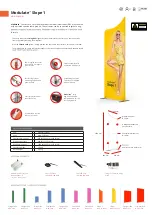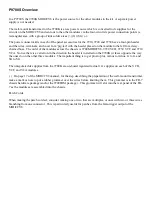
4-1
Heparin
Heparin is a naturally occurring polysaccharide. When it binds with antithrombin, a protein within blood,
the heparin antithrombin complex alters many clotting factors and reactions. Unfractionated heparin is
the most commonly used anticoagulant during cardiopulmonary bypass surgery.
Heparin Effects on Coagulation
Heparin affects the clot formation process in multiple ways. Two significant effects on clot development
are: higher heparin concentrations prolong the Coagulation Reaction Phase, increasing the ACT result,
and prolong the Clot Formation Phase, decreasing the Clot Rate. A heparin dose response on the Sonoclot
Signature is shown here. This heparin dose response, run using kaolin activation with Sienco’s kACT test,
shows the same blood sample run with different heparin concentrations.
The ACT result increases approximately linearly with
increasing heparin concentration. The ACT result generated
with the kACT is intended for high dose heparin management.
Important: ACT results among various instruments or activation
formulations can differ significantly. When considering an
alternate ACT result for heparin management, a method
comparison between the specific instruments and reagents is
necessary to ensure consistent heparin administration between
devices or reagents.
Chapter 4:
Heparin Management in
Cardiopulmonary Bypass Surgery
0
100
200
300
400
500
600
700
800
0
1
2
3
4
5
6
ACT versus Heparin Concentration
ACT (seconds)
Heparin Concentration (IU/mL whole blood)
kACT









































